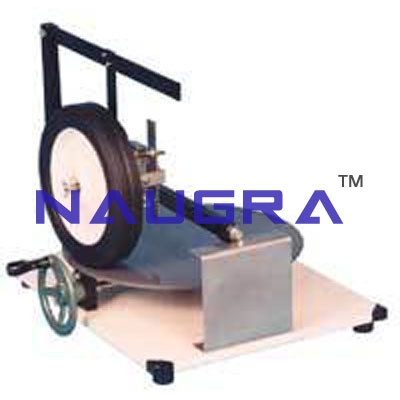- Civil Lab Mechanical Lab Engineering Lab Equipments
- sales@didacticlabequipments.com

CAT NO: DIDACTICNLE-Export-055019
Castor, Camber And King Pin Inclination Engineering Lab Training Systems.
Features
Low cost, effective teaching.
Self contained.
Bench mounted.
Variable castor, camber, king pin inclination.
Dished road wheels.
Variable wheel offset.
Demonstrates center point steering.
Rolling road enables study of wheel
stability.
Simulation of car weight and measurement of steering forces.
Three year warranty.
Range of Experiments
To show how castor, camber and king pin inclination are set up.
To show how the steering linkage is related to toe-in.
To demonstrate the effect of wheel offset.
To observe the dynamic stability of the wheel under running conditions.
To measure the forces on the steering link.
To show how the weight of the car affects self centering.
Description
Students
often experience difficulty in understanding the principles of front
wheel set-up on road vehicles, since the geometry involves angles in
three dimensions. This apparatus represents a half to third scale model
of the wishbone and king pin arrangement of a front wheel suspension
complete with a 250mm wheel on an adjustable stub axle. The king pin
assembly includes a steering link to demonstrate how a real car works.
The
basic version of the apparatus, HTM21, shows precisely how castor,
camber and king pin indication are set up and how center point steering
is achieved. A dished wheel and means of altering the offset are
included so that everything affecting center point steering can be
varied. Vernier scales measure the castor angles and king pin
inclination, while toe in and camber angles are measured from a
longitudinal and vertical datum in the way in which they would be
determined on a real vehicle. A hand driven rotating turntable simulates
a rolling road, and may be turned at a slow enough speed to study wheel
stability under running conditions.
This equipment is part of a
range designed to both demonstrate and experimentally confirm basic
engineering principles. Great care has been given to each item so as to
provide wide experimental scope without unduly complicating or
compromising the design. Each piece of apparatus is self-contained and
compact. Setting up time is minimal, and all measurements are made with
the simplest possible instrumentation, so that the student involvement
is purely with the engineering principles being taught. A complete
instruction manual is provided describing the apparatus, its
application, experimental procedure and typical test results.
